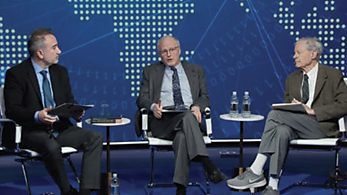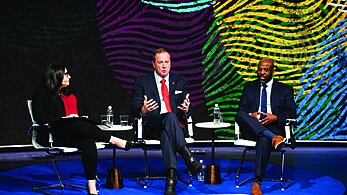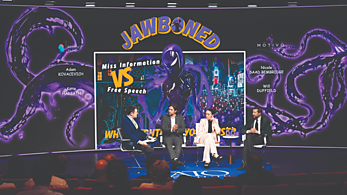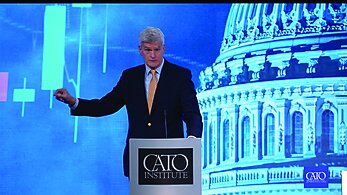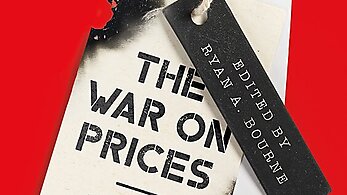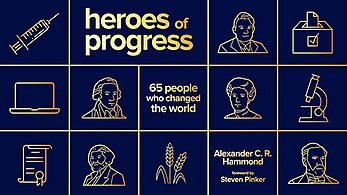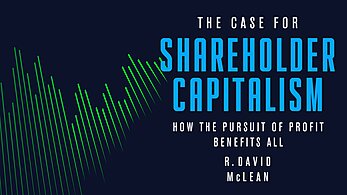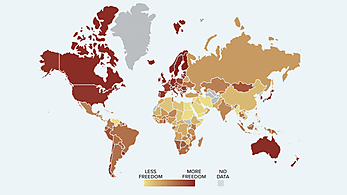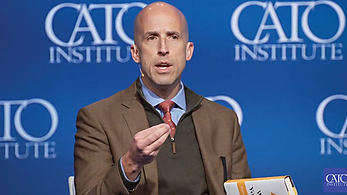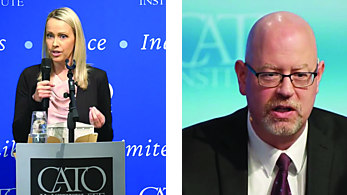A look at events, publications, and studies from the Cato Institute
Cato Quarterly
Events
Taiwan’s Urgent Need for Asymmetric Defense
Justin Logan (far left), Cato’s director of defense and foreign policy studies, and senior fellow Eric Gomez (far right), showed why Taiwan’s military is not prepared for a Chinese invasion, and what the United States can do to help buy Taiwan time. They were joined by Michael A. Hunzeker (middle left), an associate professor at George Mason University, and Alex Velez‐Green (middle right), a senior policy adviser at the Heritage Foundation.
Political Legacies of Islamic Law in the Middle East
Mustafa Akyol (left), Cato senior fellow, hosted Duke University professor Timur Kuran (center) for a discussion of Kuran’s new book, Freedoms Delayed. He focused on the persistent impact of Islamic law on civil, political, and economic liberties in the Middle East. John O. Voll (right), Professor Emeritus of Islamic History at Georgetown University, critiqued Kuran’s theses with Akyol.
Biden’s Foreign Policy
Justin Logan (far left), Cato’s director of defense and foreign policy studies, invited Chris Miller (far right), former acting US secretary of defense, to join him in conversation with Politico reporter Alex Ward (middle left) about Ward’s new book, The Internationalists: The Fight to Restore American Foreign Policy after Trump. Emma Ashford (middle right), senior fellow at the Stimson Center, also commented on how history may view the Biden administration’s foreign policy.
The Impacts of DEI
Sen. Eric Schmitt (R‑MO, middle) discussed diversity, equity, and inclusion (DEI) initiatives with Erec Smith (right), Cato research fellow, and Maria Sofia (left), manager of government affairs. DEI efforts have complex impacts on education, government and society. They considered how policymakers should approach DEI, a phenomenon that has complex and far-reaching impacts on education, government, and society.
Jawboned: The Film Premiere
The latest documentary from FedSoc Studios, Jawboned: Miss Information vs. Free Speech, investigates the distinctions between notification, persuasion, and unconstitutional government coercion of social media platforms. Cato adjunct scholar Will Duffield (far right) and former Cato legal associate Nicole Saad Bembridge (middle right) discussed the film with David Inserra (far left), Cato’s fellow for free expression and technology, and Matt Wood (middle left), who directed the film.
The Future of Online Speech
The NetChoice cases heard by the Supreme Court will have a significant impact on the future of free speech online. Steve DelBianco (right), president and CEO of NetChoice, joined Jennifer Huddleston (left), Cato’s senior fellow in technology policy, and a packed panel of other experts to discuss the implications of these cases on the First Amendment in the digital age.
Showcasing Education Entrepreneurs
Colleen Hroncich (far left), a policy analyst in Cato’s Center for Educational Freedom, hosted five education innovators for a celebration of the diverse learning options they have created for their communities and a review of the challenges government placed in their way. They represent the changing, and exciting, education landscape fueled in part by Cato’s scholarship.
Social Security Symposium
As we approach the 90th anniversary of the US Social Security program in 2025, and as the program’s trust fund is projected to be depleted by 2033, we find ourselves at a critical juncture. Romina Boccia, Cato’s director of budget and entitlement policy, gathered a diverse group of experts and policymakers to tackle this problem, including Sen. Bill Cassidy (R‑LA, pictured).
Publications
The War on Prices
Was inflation’s recent spike exacerbated by corporate greed? Do rent controls really help the needy? Are US health care prices set in a Wild West marketplace? Top economists debunk many popular misconceptions about inflation, prices, and value in this new volume edited by Ryan Bourne, Cato’s R. Evan Scharf Chair for the Public Understanding of Economics.
“The United States and indeed most of the world is coming off a major bout of inflation. Fallacies have been multiplying in the media and from commentators. Ryan Bourne has edited a new volume … that sets the record straight. Here is your go-to book on rising prices, price controls, and other government policies toward prices.”
— Tyler Cowen, Holbert L. Harris Chair of Economics at George Mason University and founder of Marginal Revolution
Radical Housing Deregulation
In this exciting new graphic novel, economist Bryan Caplan makes the economic and philosophical case for radical deregulation of the housing market, freeing property owners to build as tall and dense as they wish. Build, Baby, Build combines classic animation with careful interdisciplinary research to demonstrate the countless benefits of deregulation, such as increased social mobility, reduced inequality, lower crime, and more.
“Bryan Caplan and Ady Branzei have written a fantastically accessible and fantastically fun book explaining why housing is so expensive in the US.… It is a perfect book for your 17-year-old daughter or your 70-year-old uncle, for intro econ students or Nobel laureates, and for everyone in between.”
— Ed Glaeser, Fred and Eleanor Glimp Professor of Economics and chairman of the Department of Economics, Harvard University
Discover the World’s Heroes of Progress
The health and wealth of the modern world rests on the shoulders of dozens of unsung heroes whose work has saved millions, if not billions, of lives. Despite their contribution to improving humanity, few people know the names of these 65 pioneers. Heroes of Progress by Alexander Hammond seeks to rectify this.
“Making an inspiring case for progress at this time of skepticism and historical ingratitude is no easy feat. Yet, by relentlessly outlining the extraordinary ability of individuals to shape our world for the better, Alexander Hammond does just that.”
— Steven Pinker, author of Enlightenment Now: The Case for Reason, Science, Humanism, and Progress
Against ESG Dogma
Shareholder capitalism is increasingly criticized, especially with the popularization of concepts like environmental, social, and governance investing and stakeholder capitalism. Finance professor David McLean argues that corporate social responsibility, while well intentioned, shouldn’t replace the democratic process in policymaking and can lead to unintended consequences.
“David McLean offers a full-throated defense of shareholder capitalism by drawing on historical insights from notable economists … and linking them to current real-world examples. This highly readable book compares the shareholder capitalism approach to the stakeholder capitalism approach to dispel common misinformation, misconceptions, and fallacies about both.”
— Michael Piwowar, former commissioner of the US Securities and Exchange Commission
Human Freedom Continues Decline Worldwide
The Human Freedom Index, the most comprehensive measure of global human freedom, underscores the importance of Cato’s global work and empowers people to compare their nations to others and to advocate for pro-liberty policies. The latest edition, copublished with the Fraser Institute, analyzes 86 indicators of personal and economic freedoms for 2021, the most recent year with sufficient data, finding that human freedom fell again in the second year of the COVID-19 pandemic.
The United States ranks 17th (far from the seventh place it earned in 2000), and Switzerland takes the top spot. The index tracks the decline of freedom in Hong Kong, as well as Argentina’s sharp decline before the ascendance of Javier Milei, its new president.
“Global freedom hit a high point in 2007, followed by a slow decline until 2019. That period coincided with the aftermath of the global financial crisis and the rise of authoritarian populism and other forms of illiberalism around the world,” explains Ian Vásquez, a coauthor and Cato’s vice president for international studies. Then in 2020, as shown by Vásquez and his coauthors Guillermina Sutter Schneider, Fred McMahon, and Ryan Murphy, overall human freedom fell sharply as governments hastily curtailed individual freedoms in response to the pandemic.
Recent Cato Studies
Biden’s Misguided Crackdown on Short-Term Health Insurance
Short-term limited duration insurance (STLDI) provides affordable, comprehensive coverage to millions who are ineligible for other options or find them unaffordable. The Biden administration proposed severe restrictions on STLDI in 2023 that would limit consumer choice and reduce the contract length of short-term, affordable plans on the market. Michael F. Cannon (pictured), Cato’s director of health policy studies, makes the case that limiting STLDI would increase the number of uninsured and leave many patients with canceled coverage, lack of insurance, and avoidable health risks.
Survey: 46 Percent of Private Schools See Enrollment Rise
Demand for private schools has continued its rebound in the wake of the COVID-19 pandemic, according to a new survey from Emily Ekins, Cato’s vice president and director of polling, and Neal McCluskey, director of Cato’s Center for Educational Freedom. Forty-six percent of private schools that responded reported enrollment increases between the 2022–23 and 2023–24 school years, while 25 percent saw decreases and 30 percent reported no change. Ekins and McCluskey dissect these trends and the potential reasons for private school enrollment growth, from the pandemic to ongoing culture wars.

This work is licensed under a Creative Commons Attribution-NonCommercial-ShareAlike 4.0 International License.

